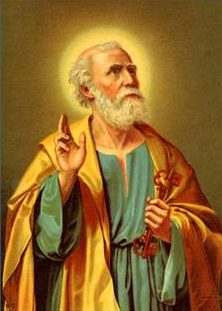
Keys of the Kingdom
After Peter confessed that Jesus is the Messiah, the Son of the living God, Jesus said to him, “Blessed are you, Simon son of Jonah. For flesh and blood has not revealed this to you, but my heavenly Father. And so I say to you, you are Peter, and upon this rock I will build my church, and the gates of the netherworld shall not prevail against it. I will give you the keys to the kingdom of heaven. Whatever you bind on earth shall be bound in heaven; and whatever you loose on earth shall be loosed in heaven.” (cf. Matthew 16:13-19)
Here, there are two things that require understanding: (1) The meaning of the keys to the kingdom and (2) the meaning of binding and loosing. There are many interpretations to these two things; here, let us take a look at the interpretation from the Catechism of the Catholic Church.
In Isaiah 22, the LORD conferred upon Eliakim, the son of Hilkiah, the key of the House of David. The key was the symbol of authority in the Kingdom of Judah; by receiving the key, Eliakim became the prime minister of Hezekiah, the king of Judah. Similarly, by using the expression “keys of the kingdom,” we can see the analogy that Jesus, as LORD, conferred upon Peter the highest human authority over His Church.
Jesus entrusted a unique mission to Peter: “You are Peter, and on this rock I will build my Church, and the gates of Hades will not prevail against it.” At the same time, Jesus entrusted a specific authority to Peter: “Whatever you bind on earth shall be bound in heaven, and whatever you loose on earth shall be loosed in heaven.” The “power of the keys” designates authority to govern the house of God, which is the Church. Jesus confirmed this mandate after His Resurrection, when He said to Peter: “Feed my lambs… Tend my sheep… Feed my sheep.” (John 21:15-17)
According to the Catechism, the power to “bind and loose” connotes the authority to absolve sins, to pronounce doctrinal judgments, and to make disciplinary decisions in the Church. Jesus entrusted this authority to the Church through the ministry of the Apostles and in particular through the ministry of Peter, the only one to whom He specifically entrusted the keys of the kingdom. (CCC 553)
When Jesus appeared to the Apostles after the Resurrection, He breathed on them and said, “Receive the Holy Spirit. Whose sins you forgive are forgiven them, and whose sins you retain are retained.” (John 20:22-23) By imparting to His Apostles His own power to forgive sins, the Lord also gives them the authority to reconcile sinners with God and the Church. (cf. CCC 1444)
The apostles and their successors carry out this mission, not only by preaching to men God’s forgiveness and calling men to conversion and faith; but also by ministering to them the forgiveness of sins in the holy sacraments of baptism and reconciliation. Through “the power of the keys,” sins are forgiven through the blood of Christ and the action of the Holy Spirit in the Church. (cf. CCC 981)
Therefore, the words “bind and loose” mean: whomever you exclude from your communion, will be excluded from communion with God; whomever you receive anew into your communion, God will welcome back into His. Reconciliation with the Church is inseparable from reconciliation with God. (CCC 1445)